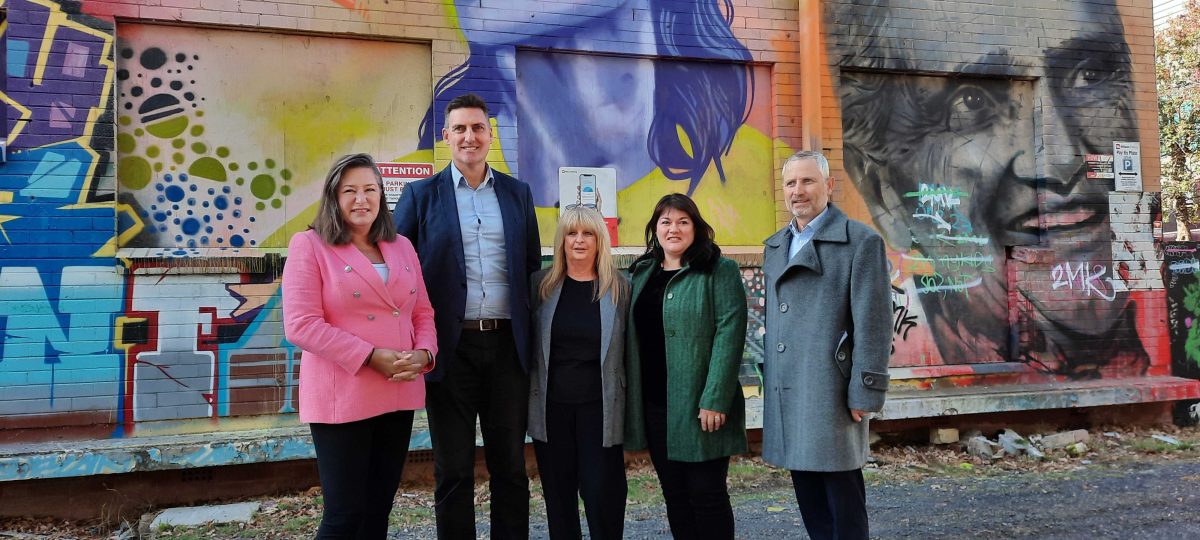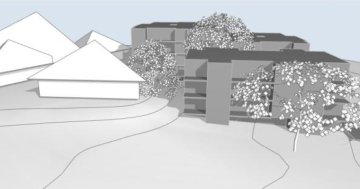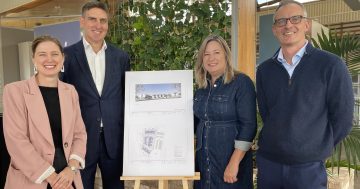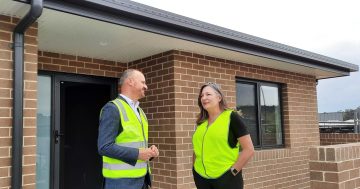
The PCYC hub building in Turner. The site will be redeveloped for affordable housing. Photo: Ian Bushnell.
A derelict building in Turner will be demolished to make way for a new Build-to-Rent housing project that will deliver 45 affordable units.
The ACT Government-backed joint venture between Canberra Police Citizens Youth Club (PCYC), community housing provider CHC and the Snow Foundation will transform the site of the former PCYC community hub in Watson Street.
The project will include 45 units with below-market rent for essential workers plus 10 social housing units for people aged 16 to 24, and a social enterprise café.
It will be the fourth project supported by the government’s $60 million Affordable Housing Project Fund, subject to planning approvals.
Other projects in the pipeline are a Marymead CatholicCare Canberra and Goulburn Build-to-Rent development in Curtin, of which all 54 units will be affordable rentals; a CHC and Canberra Southern Cross Club 140-unit Build-to-Rent project in Phillip which will include 70 affordable rental units; and the government’s $4.5 million contribution to the Ginninderry women’s build-to-rent-to-buy pilot program, a partnership between Housing Australia and CHC.
The Affordable Housing Project Fund is expected to support six projects in total, delivering up to 280 new affordable rental properties in Canberra.
Housing and Suburban Development Minister Yvette Berry said a development application for demolition of the current building and a lease variation was already in the works for the site.
Ms Berry said the project was another example of the government’s innovative response to the housing crisis.
“I’ve always said that the ACT Government couldn’t respond to or resolve the housing crisis on its own,” she said.
“Working with organisations like the ones that we’ve announced today in partnership to develop more opportunities for more affordable housing, for more rentals in the ACT, is another way that we’re using innovative ways to resolve the housing crisis.”
Mr Berry said the government was looking forward to announcing more partnerships, either with the Federal government through its Housing Australia Future Fund, or community housing providers and private businesses or developers.

Housing Minister Yvette Berry, CHC Australia CEO Andrew Hannan, PCYC CEO Cheryl O’Donnell, the Snow Foundation’s Carolyn Ludovici and PCYC President Peter Macfarlane at the Turner site. The partnership has been critical to make the project a reality. Photo: Ian Bushnell.
Canberra PCYC President Peter Macfarlane said the organisation had wanted to make use of the derelict site for years to do some good for the community.
Mr Macfarlane said the project would not only give young people at risk a roof over their heads but also provide a revenue stream for PCYC to fund programs for the young people it serves.
He said the cafe would also provide young people with work experience and hospitality training.
The partnership with CHC and the Snow Foundation had been critical in getting the project to this stage.
CHC CEO Andrew Hannan said the 45 affordable units would be let at about 75 per cent of market rent, while the tenants of the 10 social housing units would pay a percentage of their income.
Mr Hannan said the social housing units would provide supportive youth accommodation for people aged 16 to 24.
“These are people either on youth allowance or on fixed government benefits who will pay a portion of their income to reside here,” he said.
“They’ll also be provided wraparound support services to help them sort of advance through life.”
Mr Hannan said prospective tenants would be directed to the complex by support services contracted for the project.
The other tenants would be those on low to moderate incomes, such as nurses, hospitality and retail workers, and others.
Snow Foundation Place Manager Caroline Ludovici said she has seen at close quarters the difference PCYC makes to young people disengaged from the mainstream education system.
“We’ve helped fund some of their social enterprise programs, their cafes and gardening services, and these initiatives equipped young people with training skills and confidence and paved the way for future employment opportunities,” she said.
“Yet their waitlist for these such programs far exceeds the capacity they have to deliver.”
Ms Ludovici said that large-scale projects like this required collaboration from government, the business community and philanthropy.
“We’re very grateful for the support of the ACT Government who see this as a priority project,” she said.
“We look forward to future financial and planning approvals that will make this project a reality together.
“We can transform this derelict site, although I really do love the artwork, into homes for the community and provide a brighter future for our youth.”




















